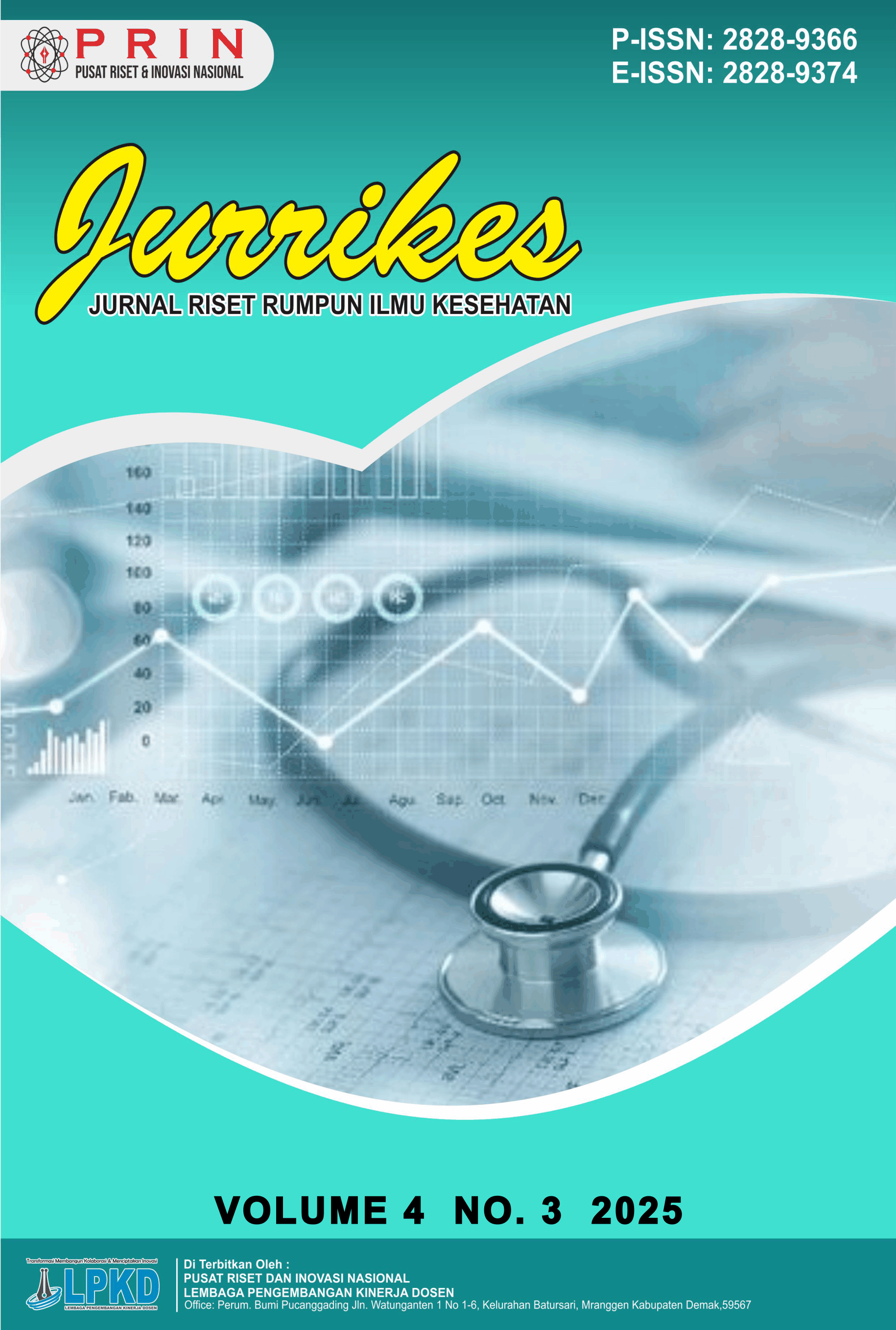Hubungan Antara Dukungan Sosial Dengan Kesejahteraan Subjektif Pada Mahasiswa Rantau
DOI:
https://doi.org/10.55606/jurrikes.v4i3.6368Keywords:
Regional Students, Social Support, Subjective Well-being, Adaptation, Psychological ProblemsAbstract
Students who live away from home often face various challenges in the adaptation process, ranging from separation from family, demands for independence, to adjustment to a new environment. These factors can increase the risk of feelings of loneliness and psychological problems, and potentially reduce their subjective well-being. This study aims to explore the relationship between social support and subjective well-being among students who live away from home, and to analyze the relationship between each aspect of social support and subjective well-being. The method used in this study is a quantitative approach with a correlational design, and the sampling technique applied is accidental sampling. The population of the study was students who lived away from home, with a sample size of 384 participants. The instruments used in this study included the Multidimensional Scale of Perceived Social Support, the Satisfaction With Life Scale, and the Positive Affect Negative Affect Schedule. The results of the analysis showed a significant positive relationship between social support and subjective well-being, with a p value <0.001. In addition, the correlation analysis of the three aspects of social support showed that each aspect had a significant relationship with subjective well-being. These findings indicate that social support is one of the key factors influencing the subjective well-being of students who live away from home. Thus, it is crucial for students to build a strong social support network to improve their well-being during their time away from home. This research provides valuable insights for developing support programs for students living away from home to help them adapt better. Furthermore, support from friends, family, and the surrounding community can help students cope with the stress and challenges they face during their time away from home. This suggests that building positive social relationships is crucial for their mental and emotional well-being.
Downloads
References
Al Amelia, S. D., Pratikto, H., & Nainggolan, E. E. (2022). Dukungan sosial dan subjective well-being pada mahasiswa rantau. INNER: Journal of Psychological Research, 2(1), 58–66.
Cohen, S., & Wills, T. A. (1985). Stress, social support, and the buffering hypothesis. Psychological Bulletin, 98(2), 310. https://doi.org/10.1037/0033-2909.98.2.310
Coşan, D. (2014). An evaluation of loneliness. The European Proceedings of Social & Behavioural Sciences, 1(1), 103–110. https://doi.org/10.15405/epsbs.2014.05.13
Diener, E. (1984). Subjective well-being. Psychological Bulletin, 95(3), 542. https://doi.org/10.1037/0033-2909.95.3.542
Diener, E., & Suh, E. (1997). Measuring quality of life: Economic, social, and subjective indicators. Social Indicators Research, 40, 189–216. https://doi.org/10.1023/A:1006859511756
Halim, C. F., & Dariyo, A. (2016). Hubungan psychological well-being dengan loneliness pada mahasiswa yang merantau. Jurnal Psikogenesis, 4(2), 170–181. https://doi.org/10.24854/jps.v4i2.344
Hasibuan, M. A. I., Anindhita, N., Maulida, N. H., & Nashori, F. (2018). Hubungan antara amanah dan dukungan sosial dengan kesejahteraan subjektif mahasiswa perantau. Psikohumaniora: Jurnal Penelitian Psikologi, 3(1), 101–116. https://doi.org/10.21580/pjpp.v3i1.2214
Hayafatunisa, G., & Suyasa, P. T. Y. S. (2024). HUBUNGAN ANTARA PERSEPSI DUKUNGAN SOSIAL DAN KESEJAHTERAAN SUBJEKTIF (Studi Pada Mahasiswa Di Jakarta). Jurnal Psikologi Dan Bimbingan Konseling, 7(2).
Istanto, T. L., & Engry, A. (2019). Hubungan Antara Dukungan Sosial Dan Homesickness Pada Mahasiswa Rantau Yang Berasal Dari Luar Pulau Jawa Di Universitas Katolik Widya Mandala Surabaya Kampus Pakuwon City. Experientia: Jurnal Psikologi Indonesia, 7(1), 19–30. https://doi.org/10.33508/exp.v7i1.2120
Kurniawan, S. R., & Eva, N. (2020). Hubungan antara dukungan sosial dengan kesejahteraan psikologis pada mahasiswa rantau. Seminar Nasional Psikologi Dan Ilmu Humaniora (SENAPIH), 1(1).
Lana, M. C. D., & Indrawati, K. R. (2021). Peranan kualitas persahabatan dan kecerdasan emosional pada kebahagiaan remaja. Jurnal Psikologi Udayana, 8(1), 95–108. https://doi.org/10.24843/JPU.2021.v08.i01.p10
Malay, E. D., Otten, S., & Coelen, R. J. (2023). Predicting adjustment of international students: The role of cultural intelligence and perceived cultural distance. Research in Comparative and International Education, 18(3), 485–504. https://doi.org/10.1177/17454999231159469
Pasya, M. R. Z., & Pratisti, W. D. (2023). Hubungan Antara Stress Akademik Dan Dukungan Sosial Dengan Kesejahteraan Subjektif Mahasiswa Tahun Pertama. Universitas Muhammadiyah Surakarta.
Pebrian Diandra, F., Hapsari, A. T., & Santoso, B. (2024). Fenomena Culture Shock pada Mahasiswa Perantauan di Yogyakarta (pp. 4 (2), 557–565). https://doi.org/10.47233/jkomdis.v4i2.1874
Permata, D. C., & Listiyandini, R. A. (2015). Peranan pola asuh orang tua dalam memprediksi resiliensi mahasiswa tahun pertama yang merantau di jakarta. Prosiding Pesat, 6.
Pramasella, F. (2019). Hubungan antara lima besar tipe sifat kepribadian dengan kesepian pada mahasiswa rantau. Psikoborneo, 3(7), 648–661. https://doi.org/10.30872/psikoborneo.v7i3.4805
Rulanggi, R., Fahera, J., & Novira, N. (2021). Faktor-faktor yang memengaruhi subjective well-being pada mahasiswa. Seminar Nasional Psikologi Dan Ilmu Humaniora (SENAPIH), 1(1), 406–412.
Sagiv, L., & Schwartz, S. H. (2000). Value priorities and subjective well‐being: Direct relations and congruity effects. European Journal of Social Psychology, 30(2), 177–198. https://doi.org/10.1002/(SICI)1099-0992(200003/04)30:2<177::AID-EJSP982>3.0.CO;2-Z
Saputri, N., Setiawan, R., & Hayat, N. (2024). Proses Adaptasi Culture Shock Pada Mahasiswa Rantau FKIP Untirta. Edu Sociata: Jurnal Pendidikan Sosiologi, 7(2), 260–268. https://doi.org/10.33627/es.v7i2.2775
Simanjuntak, J., Prasetio, C. E., Tanjung, F. Y., & Triwahyuni, A. (2021). Psychological well-being sebagai prediktor tingkat kesepian mahasiswa. Jurnal Psikologi Teori Dan Terapan, 11(2), 158. https://doi.org/10.26740/jptt.v11n2.p158-175
Sulfemi, W. B., & Yasita, O. (2020). Dukungan sosial teman sebaya terhadap perilaku bullying. Jurnal Pendidikan, 21(2), 133–147. https://doi.org/10.33830/jp.v21i2.951.2020
Utami, M. S. (2012). Religiusitas, koping religius, dan kesejahteraan subjektif. Jurnal Psikologi, 39(1), 46–66.
Zatayumni, S. I., & Siregar, M. F. Z. (2024). Kesejahteraan Psikologis Anak Rantau: Pentingnya Peran Orang Tua dalam Mendukung Melalui Teknologi Jarak Jauh. Ability: Journal of Education and Social Analysis, 30–42. https://doi.org/10.51178/jesa.v5i2.2031
Downloads
Published
How to Cite
Issue
Section
License
Copyright (c) 2025 JURNAL RISET RUMPUN ILMU KESEHATAN

This work is licensed under a Creative Commons Attribution-ShareAlike 4.0 International License.







